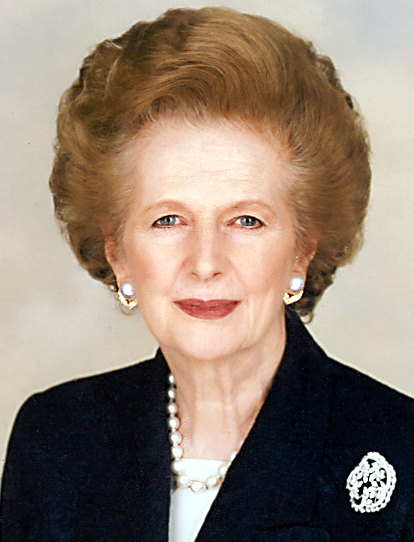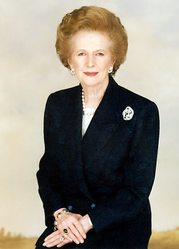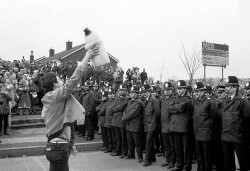In 1987 Thatcher famously made her society speech:
"There is no such thing as society; there are individual men and women, and there are families."
Mrs. Thatcher was quite vocal when it came to the relationship between the individual and society, and was heavily influenced by American right leaning thinkers who advocated that the welfare state gave birth to, and nurtured, an underclass of individuals who were, frankly, irresponsible.
The prime minister voiced her opinions about single parenthood and claimed, on more than one occasion, that many single women with children had become so in order to claim benefits and a council flat.
In fact, Thatcher considered single parents to be a social and economic burden. Her values regarding the family were Victorian, some would say draconian, and she believed that only the conventional family should be recognized; not unmarried couples, however stable, and certainly not same sex couples.
During a speech in Kentucky in 1998, long after her resignation as PM, Thatcher claimed that:
"It is far better to put these children [of single parents] in the hands of a very good religious organisation, and the mother as well, so that they will be brought up with family values." Thatcher also maintained that welfare provision to single mothers had exacerbated the problem, which indeed was the view she held whilst in office.
According to Jonathan Shaw, Senior Research Economist at the IFS, the number of children living in poverty rose from 1.8 million when Thatcher was elected, to 3.6 million by the time of her resignation.










 A Colorful Journey: Comparing and Contrasting Mexican Folk Art With Polish Folk Arton 09/05/2024
A Colorful Journey: Comparing and Contrasting Mexican Folk Art With Polish Folk Arton 09/05/2024
 Exploring Traditional Japanese Tapestry Landscape Art: A Window into Nature’s Serenityon 09/01/2024
Exploring Traditional Japanese Tapestry Landscape Art: A Window into Nature’s Serenityon 09/01/2024
 Are Border Collies Really the Smartest Dog Breed?on 08/20/2024
Are Border Collies Really the Smartest Dog Breed?on 08/20/2024
 A Writer's Guide To Wizzley- A Gem of A Bookon 04/10/2013
A Writer's Guide To Wizzley- A Gem of A Bookon 04/10/2013



Comments
One of the unremarked social injustices of Thatcher's regime was the fact that while she ] she boosted pay for armed forces and police [often deserved] she shrank it for other public sector workers. The explanation. The police and the armed forces were to be her defence against the people. Public money, under her regime, was being unfairly distributed to suit the interests of the ruling party and class. How far does a politician have to go before you judge that they were evil?
This article reminded me why I'm glad it's not the 80s anymore. That's when we had Reagan and Bush over here and it was okay to be a backward bigot. I was about as happy about Reagan's death as many in the UK were happy about Thatcher's death.
The coalition has not followed her interest rates policy, which was to raise interest rates to fifteen per cent and keep them there for years. I had my first mortgage just before she was elected and raised rates. I had years of the ordeal of trying to pay a usurious rate, while rich Tories feasted on the profits of their investments and argued that high rates were a good thing.
Hi jptanabe,
Thank you! Living under the Thatcher regime was very unpleasant indeed for many of us. Her policies ruined lives and caused a great deal of suffering.
Hi Frank,
I was at school when Thatcher first came to power- I also remember how underfunded our school was, five of us would share a text book etc. I also had my first mortgage under Thatcher, the interest rates crippled me, as did the poll tax. As young as I was, I remember how our rights as workers diminished in just a few short years. She made life hell for ordinary people.
Hi John,
Yes, there was a definite campaign to silence those who had no interest in paying tribute to that woman. I fear that there will never be a thorough and balanced appraisal of her leadership whilst this govt. continue with her dreadful neo-con policies. In fact, I'd go as far as to say that history is repeating itself, with the current coalition going further than even she would fear to tread. It's as if she's still in power, sadly.
An email telling me jptanabe had posted a comment prompted me to re-read this article. At the time you wrote this, there was a definite campaign to "not speak ill of the dead." Those voices criticising her were being silenced and those praising her were being amplified. It was as if Thatcher's legacy was being carved out of stone and fixed forever at that moment. Now, months down the line, you would hope that a thorough and balanced critical appraisal might be in the pipeline. I hope so. We can't let the Tories have the final say in this story.
As a Briton who is basically civilised and of good will, who isold enough to have lived through the Thatcher years [I am 63] I did not celebrate her death, but I did not mourn. She was an uncaring person with a narrow doctrinaire view of economics, who served the interest of the capitalists at the expense of the interests of the people. Her economic policy was to impose crippling mortgage rates and use unemployment to control inflation, both of which caused great pain, and she cared not a jot. For her, workers counted as mere chaff. To use her words of workers, "their function is to serve.." Wealthy people grew rich under her governance, while ordinary people were ground under and impoverished. Directors enjoyed high wage rises, while workers were told to take one per cent or so and be grateful. Margaret Thatcher was social injustice embodied.
I will not celebrate her death. The death of a saint is not a cause of sorrow, for the saints are heaven bound. Thatcher was no saint. I pass no comment on her final destiny.
Great article explaining how Margaret Thatcher managed to be so unpopular. I have memories of hating her as Education Secretary while a student in Scotland. I was living in the US by the time she became Prime Minister so didn't experience her policies directly then.
Hi Mira,
Thank you. I haven't watched David Cameron to be honest. This country is rather split when it comes to Mrs T and her legacy- after writing this page I've tried to avoid the tributes. :)
I enjoyed this. I wish I'd seen the movie with Meryl Streep as well :). Also, I just heard part of David Cameron's speech in Parliament. It was rather interesting.
Hi Sheilamarie,
I think that's where the division comes in, if you belonged to the group who Thatcher was pro, you were unlikely to be adversely affected by her policies. She was quite skilled when it came to pitting neighbour on neighbour, black on white, employed on unemployed. A trend we're seeing again in this country. But yes, I do agree that becoming anti another human being is not only undesirable, but unfathomable.